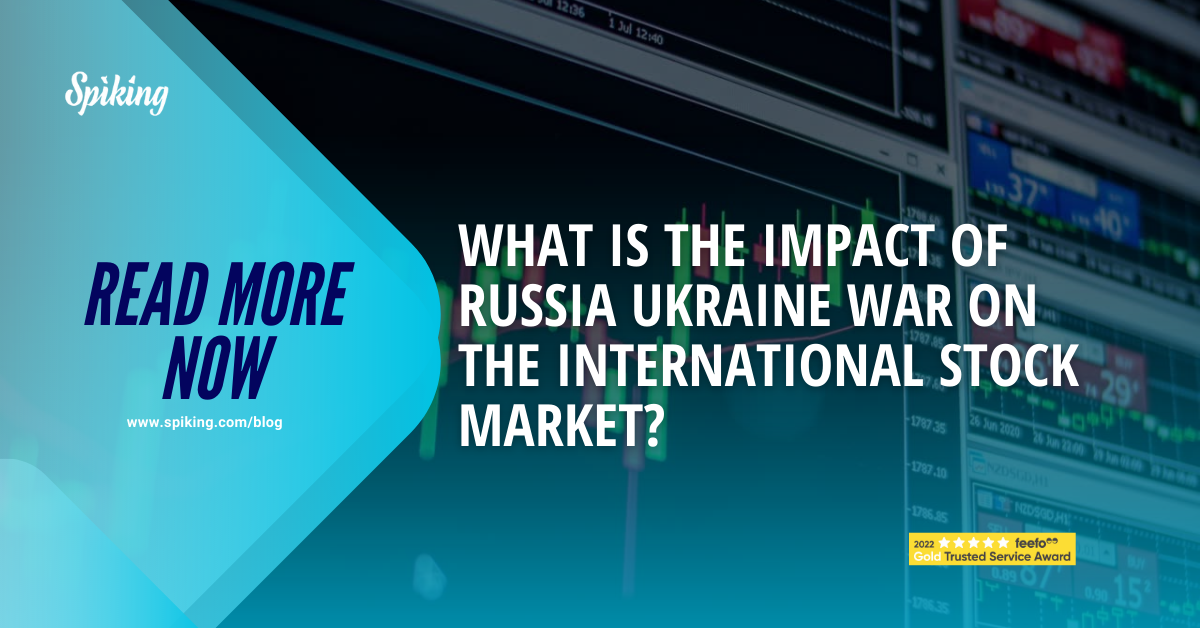
What Is The Impact Of Russia Ukraine War On the International Stock Market?
Global markets usually recover after wars and natural disasters, and they are expected to do so again this time. However, the impact of Russia's Ukraine war on the stock market significantly increases the threats. Read on to find out more.
The Russian invasion of Ukraine on February 24 sparked significant policy decisions and market movements throughout the world. The Russian currency has stayed at all-time lows, and the Russian stock market has been closed since February 25, while oil has risen beyond $130 per barrel (bbl) for the very first time after 2008, and gas prices are rising to new highs. The European Union (EU), the United States, the United Kingdom, Canada, Switzerland, Japan, Australia, and Taiwan have all worked together to coordinate sanctions globally.
President Biden signed an executive order on March 8 prohibiting the importation of Russian oil, LNG, and coal into the United States, as well as new US engagement in Russia's energy industry. The UK has committed to scale-out Russian oil supplies by the close of the year whereas the EU has announced a new energy security strategy concentrating on LNG and pipeline gas delivery to spread supply away from Russia.
Profitable Pockets In Stock Market
After all, not all equities have been plummeting. Increasing oil and gas prices have boosted the S&P 500 in the energy industry, which has returned 21.8 percent a year.
This was despite an 8.8% drop in the total index, which is typically seen as a barometer for the whole stock market.
The S&P 500 is led by energy corporations such as Halliburton, Imperial Petroleum, and Schlumberger. And American investors have over $140 billion in commodities exchange-traded funds (ETFs), primarily focused on energy, such as the $35 billion Energy Select SPDR Fund, which has gained 23.4 percent.
However, the stock market as a whole has been beset by issues such as increasing interest rates, soaring inflation, and persistent supply-chain bottlenecks. The market is expected to be further pressurized by Russian threats to Ukraine.
The Initial Repercussions Of Russia Ukraine War Impact On Stock Market
Oil is already expensive, with prices surpassing $100 per barrel, up from around $65 a year ago. It's expected to rise far higher, particularly if Russia launches a massive invasion and the US and its supporters respond with heavy financial penalties.
Consumers are already suffering from high oil costs. They are reflected in the most visible indicator of high inflation, the cost of fuel, that, as per AAA, currently averages $3.53 a gallon. The economy in the United States is at 7.5 percent, a 40-year peak.
Caroline Bain, the principal commodities strategist at Capital Economics, wrote on February 16:
"A lot depends on if International sanctions are imposed on Russian energy corporations or if Russia decides to stop supplying energy to the West." "Natural gas prices may easily double momentarily, and russia ukraine war impact on stock market of gas prices might linger for longer," she added under the worst scenario.
Global Stocks
For US corporations, the Russia-Ukraine situation poses the risk of a moderate profit. An oil price shock, along with a central bank shift focused on inflation, might weaken investor morale even further.
Local Russian banks are by far the most vulnerable to sanctions, followed by European banks having local legal companies in Russia.
Based on stated sales, US corporations have limited direct exposure to Russia (approximately 0.6 percent for anyone in the Russell 1000 index) and Ukraine (0.1 percent). Indirect dangers might be more serious, such as:
Higher energy and food costs have slowed the global economy and consumer spending.
- Second-order adverse impacts in Europe
- Disruptions in supply chains
- Credit and equity write-downs
- Threats to cybersecurity
- Monetary policy tightening
As central banks deal with inflationary expectations, restrictive monetary policy continues to be a significant risk for markets. Additional fiscal incentives, such as a drop in the US gas tax, may be considered by policymakers.
Certain emerging market (EM) stocks, particularly commodities exporters, could do well as interest rates and energy costs rise. Energy and commodities, as well as the Middle East, North Africa, and Latin America will most likely benefit, while medicine and property investment would suffer the most.
Based on the supply disruption of Russia-centric products, European miners should anticipate rising commodity prices. Palladium is the most vulnerable metal, with Russia responsible for over half of world output — prices have risen by roughly 65 percent since mid-December 2021. Russia contributes more than 10% of the global production of diamonds, platinum, and gold, while Russia and Ukraine together account for almost 35% of steel imports into the EU-27.
Emerging Markets in Transition
Prices of commodities, monetary policy, and the de-leveraging of overcrowded positions are the primary emerging market (EM) disturbances stemming from the Russia-Ukraine conflict.
Geopolitical threats, on the other hand, are unlikely to disrupt the current macro trade storylines in EM.
Russia's credit rating was reduced to junk by all three major rating agencies on February 25, with S&P downgrading Russia from BBB- to BB+ and placing the rating on credit alert with adverse repercussions. On March 2, Moody's and Fitch both downgraded the company to junk status. Russian corporates' main fear would be a technical collapse owing to probable payment limitations, but Ukraine issuers might risk operational difficulties or wider reserve loss. External bonds issued by Russian corporations total $99 billion, with some other $12 billion from Ukraine creditors.
In reaction to market disturbances and their influence on the indices' replicability, J.P. Morgan fixed income indexes are using the standardized index technique. As a result, Russia can be banned from all fixed income indices. Higher commodity prices and the loss of Russian supply to global markets will help commodity exporters in Australia, Canada, Latin America, and South Africa. Asia and the Middle East,, will give more stability, whereas Latin America will gain from rising commodity prices.
Asia could profit from a better quality profile and a bigger share of local investors, making it less vulnerable to a reversal in international EM flows, while the Middle East will benefit from rising oil prices. Africa's commodity-heavy economy should also do better. The current sell-off has offered stronger entry positions for some Latin American corporate credits, like financials, mining, and oil and gas producers. Rising interest rates or rising commodity prices will help these industries' issuers.
Russia Ukraine War Impact On Markets is still not under control and cannot be analyzed correctly, but you need to check what will be future of your investment. Get expert advice on Spiking!



